
Melvin Van Peebles was an American actor, filmmaker, writer, and composer. He worked as an active filmmaker into the 2000s. His feature film debut, The Story of a Three-Day Pass (1967), was based on his own French-language novel La Permission and was shot in France, as it was difficult for a black American director to get work at the time. The film won an award at the San Francisco International Film Festival which gained him the interest of Hollywood studios, leading to his American feature debut Watermelon Man, in 1970. Eschewing further overtures from Hollywood, he used the successes he had so far to bankroll his work as an independent filmmaker.

Mario Van Peebles is an Mexican-American film director and actor best known for appearing in Heartbreak Ridge in 1986 and known for directing and starring in New Jack City in 1991 and USS Indianapolis: Men of Courage in 2016. He is the son of actor and filmmaker Melvin Van Peebles, whom he portrayed in the 2003 biopic Baadasssss!, which he also co-wrote and directed.

Sweet Sweetback's Baadasssss Song is a 1971 American film written, co-produced, scored, edited, directed by, and starring Melvin Van Peebles. His son Mario Van Peebles also appears in a small role, playing the title character as a young boy. The film tells the picaresque story of a poor black man fleeing from the white police authorities.
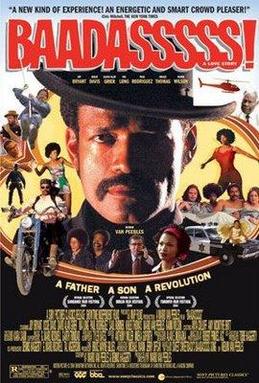
Baadasssss! is a 2003 American biographical drama film, written, produced, directed by, and starring Mario Van Peebles. The film is based on the struggles of Van Peebles' father Melvin Van Peebles, as he attempts to film and distribute Sweet Sweetback's Baadasssss Song, a film that was widely credited with showing Hollywood that a viable African-American audience existed, and thus influencing the creation of the Blaxploitation genre. The film also stars Joy Bryant, Nia Long, Ossie Davis, Paul Rodriguez, Rainn Wilson, and Terry Crews.
Herman Raucher was an American author and screenwriter who penned the autobiographical screenplay and novel Summer of '42, which became one of the highest-grossing films and one of the best selling novels of the 1970s. Raucher began his writing career during the Golden Age of Television, when he moonlighted as a scriptwriter while working for a Madison Avenue advertising agency. He effectively retired from writing in the 1980s after a number of projects failed to come to fruition, though his books remain in print and a remake of one of his films, Sweet November, was produced in 2001.

The Story of a Three-Day Pass is a 1967 film written and directed by Melvin Van Peebles, based on his French-language novel La Permission. It stars Harry Baird as a black American soldier who is demoted for fraternizing with a white shop clerk in France.
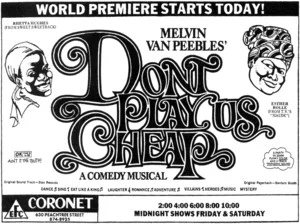
Don't Play Us Cheap is a 1973 American musical comedy film based on the 1970 musical of the same name. The musical was written, produced, scored, edited and directed by Melvin Van Peebles. Both the original stage musical and the film adaptation are based on Van Peebles' 1967 French-language novel La fête à Harlem (1967).
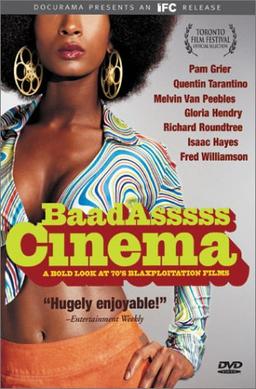
BaadAsssss Cinema is a 2002 TV documentary film directed by Isaac Julien. Julien looks at the Blaxploitation era of the 1970s in this hour-long documentary.

"Sweet Seymour Skinner's Baadasssss Song" is the nineteenth episode of the fifth season of the American animated television series The Simpsons, and the 100th episode overall. It originally aired on the Fox network in the United States on April 28, 1994. In the episode, Superintendent Chalmers fires Principal Skinner after a disaster at the school. Bart, feeling partially responsible for Skinner's firing, tries to help his old principal get his job back.
Cinemation Industries was a New York City-based film studio and distributor owned and run by exploitation film producer Jerry Gross.
Guerrilla filmmaking refers to a form of independent filmmaking characterized by ultra-low micro budgets, skeleton crews, and limited props using whatever resources, locations and equipment is available. The genre is named in reference to guerrilla warfare due to these techniques typically being used to shoot quickly in real locations without obtaining filming permits or providing any other sort of warning.

What the...You Mean I Can't Sing?! is the fourth studio album by Melvin Van Peebles. Released in 1974, this album marks the first traditional music effort by Van Peebles. Previously, Van Peebles released the experimental spoken word albums Brer Soul, Ain't Supposed to Die a Natural Death and As Serious as a Heart-Attack.

Ghetto Gothic is the fifth studio album by Melvin Van Peebles. Released in 1995, this album marks the second traditional music effort by Van Peebles, after What the....You Mean I Can't Sing?! Previously, Van Peebles released the experimental spoken word albums Brer Soul, Ain't Supposed To Die a Natural Death and As Serious as a Heart-Attack.
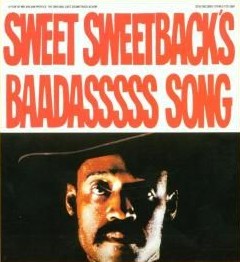
Sweet Sweetback's Baadasssss Song is the soundtrack to Melvin Van Peebles' 1971 feature film of the same name. The soundtrack was performed by then-unknown Earth, Wind & Fire and released in 1971 on Stax Records. To attract publicity for the film without spending significant money, the soundtrack was released before the movie; it performed well, reaching No. 13 on the Billboard Top R&B Albums chart.

ConfessionsOfa Ex-Doofus-ItchyFooted Mutha is a 2008 film by Melvin Van Peebles. It is based on Van Peebles' 1982 Broadway musical Waltz of the Stork and his graphic novel of the same name. The film was screened at the Tribeca Film Festival in April 2008 and was the Closing Night feature in the Maryland Film Festival in May 2008. Van Peebles plays the film's main character from boyhood to age 47.

Blaxploitation is an ethnic subgenre of the exploitation film that emerged in the United States during the early 1970s, after the demand of the Black Panthers for black artists to reclaim the power and rights to their image from the UCLA, and the new rating system within Hollywood allowed up and coming black film makers and actors to create black films for black audiences. The term, a portmanteau of the words "black" and "exploitation", was coined in August 1972 by Junius Griffin, the president of the Beverly Hills–Hollywood NAACP branch. He claimed the genre was "proliferating offenses" to the black community in its perpetuation of stereotypes often involved in crime. After the race films of the 1940s and 1960s, the genre emerged as one of the first in which black characters and communities were protagonists, rather than sidekicks, supportive characters, or victims of brutality. The genre's inception coincides with the rethinking of race relations in the 1970s.
Classified X is a 1998 French-US documentary movie written by Melvin Van Peebles, directed by Mark Daniels and narrated by Van Peebles, that details the history of black people in American cinema throughout the 20th century. According to the review in Variety:
"... Van Peebles' distinctive analyses and his ever-growing importance to new black helmers via 1971's breakthrough Sweet Sweetback's Baadasssss Song make this a package with shelf life for cinematheques, schools and select broadcaster webs.... Scaredy-cat comedy-relief types, jungle "savages," mammies and minstrels gave way after World War II to "The New Negro" -- a put-upon "keeper of conscience" for the white protagonists. Pic briefly exits Hollywood to consider the independent black cinema that flourished -- with strict low-budget bounds -- from silent days till the late '40s, supported by a network of blacks-only theaters."
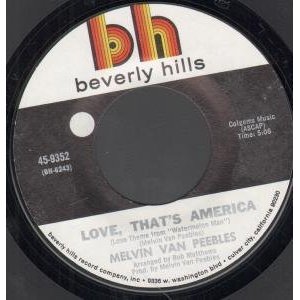
"Love, That's America" is a song written by Melvin Van Peebles in 1970 for his film Watermelon Man. He re-recorded it for his 1971 album As Serious as a Heart-Attack. In 2011, the song became associated with the Occupy Wall Street movement due to being used on videos featuring footage from the movement.

How to Eat Your Watermelon in White Company (and Enjoy It), is a 2005 documentary film directed and written by Joe Angio, and produced by Michael Solomon. The film follows Melvin Van Peebles through his illustrious musical, acting, and directing career. The name comes from a controversial article that Van Peebles wrote, but never got published. Joe Angio, the director received four nominations for his film. Three of these nominations were for best documentary at the Chicago International film festival, and one nomination was at the Los Angeles Film Festival for best documentary feature.
Robert Maxwell was an American cinematographer known for his work on B movies, pornography, and exploitation films of the 1960s and 1970s. His best-known credits include Melvin Van Peebles' Sweet Sweetback's Badasssss Song and Don't Play Us Cheap.













